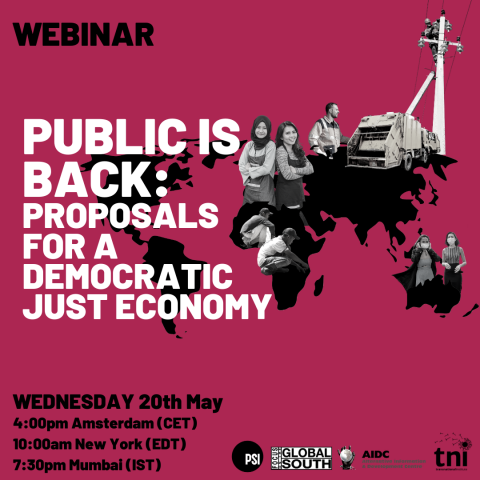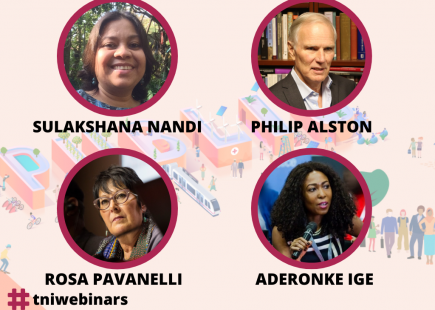The Public is Back Proposals for a democratic and just economy
Topics
The COVID-19 pandemic has laid bare the necessity of robust public services for the protection of the vulnerable and the needs of the many. On 20 May 2020, the Transnational Institute, along with Public Services International (PSI) (external link), Focus on the Global South (external link), and the Alternative Information and Development Centre (South Africa), (external link) brought together four speakers to discuss how to rebuild post crisis to create a more democratic and just economy.

The speakers included:
- Philip Alston (external link), outgoing UN Special Rapporteur on extreme poverty and human rights;
- Rosa Pavanelli (external link), General Secretary of the global union federation Public Services International (PSI);
- Aderonke Ige (external link), Our Water, Our Rights Campaign in Lagos / Environmental Rights Action /Friends of The Earth Nigeria ;
- Sulakshana Nandi (external link), Co-chair, People's Health Movement Global (PHM Global).

COVID-19 and privatization’s assault on the public
This is not a time to return to normalcy. Normality means following the logic of neoliberalism and the steady creeping of privatization into public services. Philip Alston, who has just finished a 6 year term as UN rapporteur, noted that the present moment is situated in a long history of ‘governments washing their hands of human rights obligations by passing over the relevant [public] sectors to the private sectors’.
This has had disastrous consequences. A notable example is the response to the pandemic in the United States, which has until now lacked any form of coordination or effective public response, resulting in the highest number of COVID-19 associated deaths of any country in the world (175,000 as of 26 August). Unemployment has also rocketed up, with 16 million unemployed (as of end July) indicating that the economic disaster is still showing no signs of abatement (external link). In the United States, the lack of an adequate public health insurance scheme means that the majority of residents are insured through their employers. The mass unemployment wave has subsequently resulted in millions (external link) losing their health insurance during a pandemic (external link). Additionally, insufficient funding of the health sector has resulted in shortages of Personal Protective Equipment (PPE), ventilators (external link), and staff. Finally, the lack of a robust public services sector means that many are struggling immensely to cope with the sudden economic shock of the pandemic, leading many to press for a reopening of the economy - not only due to indifferent individualism, but also desperation.
Salukshana Nandi, the co-chair of the People’s Health (external link)Movement (external link), painted a similar picture of the Indian health sector. Although it is often described as ‘the largest public health care scheme in the world’ (external link), Nandi described that the privatization of the healthcare system is taking place under the neoliberal language of ‘choice, quality, and competition’. Nandi pointed out that the privatization of the Indian healthcare system (external link) takes several forms: directly, through regional hospitals being handed over to the private sector, and indirectly, as public funds are siphoned to private health insurance schemes. In response to the pandemic, Nandi notes that when it came to testing, surveillance, and treatment for COVID-19, the private sector has been almost entirely absent outside urban centres. Even within urban centres, treatment and care has been prohibitively expensive for many.
Nandi also noted that not all states within India have struggled to the same extent in coping with the pandemic. The state of Kerala has stood out for its response, thanks to a well-funded public health infrastructure system, coordinated by its left-wing government. Central to its model is a decentralized community centred governance and coordination (external link) structure, an emphasis on public education, and valuing preventative care. As of 28 August, 2020, the state of Kerala has 66,761 confirmed cases and (external link)276 (external link)deaths (external link), out of a total estimated population of 36 million. The result is among the lowest death per population ratios around the world.
In discussing the circumstances of the Lombardy region within Italy, one of the hardest hit regions by COVID-19, Rosa Pavanelli highlighted the tension between the political ideologies of local, national, and regional governments. The Italian response to the pandemic differed from the United States by freeing up resources to support those who were going to be unemployed, protecting workers, and freeing up capital so that the immense financial burden experienced elsewhere was reduced. However, Pavanelli noted that there has been a historic move within regional governments of Italy to privatize health services - some estimates put the proportion of public funds siphoned into private facilities at nearly 50%. (external link)Pavanelli explained that the high proportion of deaths within the Lombardy region was due to the right-wing regional governments which had dismantled preventive services, care for the vulnerable, and other social programmes. These services, once defunded or underfunded, were subsequently deferred to hospitals. When these hospitals were overwhelmed by the pandemic, the services were unable to function.
The defence of the Public and rebuilding a more just economy
‘[I] cannot emphasize more emphatically that the prioritization of people’s rights and welfare should be the primary focus of any government, and even society’, argued Aderonke Ige as she described her work within Lagos in the ‘Our Water, Our rights’ (external link)campaign.
A global fight against the tide of privatization is being waged in communities around the world. The ‘Our Water, Our right’ campaign in Lagos shows how the fight for public services in public hands is being fought for successfully, spearheaded by grassroots community efforts. Aderonke Ige explained that the impact of the campaign was due to the way it brought together ‘labour unions, communities, women and youth groups, among others’.
Standing up against two successive administrations working to privatize water in Lagos (one in 2014, the other in 2019), the campaign has forcefully push (external link)ed (external link)back against these moves (external link). The COVID-19 pandemic has merely strengthened the argument that water is a right for all within the city Lagos. Defence of this ideal protects dignity and saves lives, especially during a pandemic.
The speakers each continued with visions and recommendations for the creation of a more just post-pandemic economy.
Rosa Pavanelli emphasized the ways in which the pandemic has shown the fundamental interconnected dependencies and deficiencies within the global supply chain. ‘We have witnessed the fragility and weakness of the global division of labour’. Pavanelli highlighted the vulnerabilities particularly within the intertwined food and healthcare service production systems. That nations had no existing infrastructure to domestically produce personal protective equipment, and that the closing of borders and trade diminished people’s right to food, show how necessary it is to build a stronger and less vulnerable food production system (external link). Pavanelli also noted the importance of holding to account those working to commodify goods such as academic research into new drugs and treatments, as these must be understood as goods for all of humanity. Pavanelli closed by demanding a tax on wealth, and on digital corporations, to build a more equitable and resilient society for all.
Aderonke Ige made explicit that a more just economy can only develop and succeed through engagement with diverse communities and through grassroots development and organization. Within the Our Water, Our Rights campaign, Ige noted the fundamental importance of women’s central role, as this was how the Africa women water sanitation and hygiene network coalition was born. Aderonke Ige concluded: ‘we want to see a public that truly belongs to everyone, not just a select few’.
Salukshana Nandi closed in a similar vein ‘in terms of the public, two key words for me are equity and solidarity. We must be conscious of power dynamics within groups. To make sure the most vulnerable are getting their voice heard within decision making’.
Finally, Philip Alston and Rosa Pavanelli closed with warnings on the ways that the pandemic might impact civic and democratic rights. Rosa Pavanelli noted that early on in the pandemic, there was a lack of transparency within hospitals and especially elderly care homes; that workers were forcibly silenced when it came to making public the circumstances inside. She closed by saying ‘that this is a limitation on the rights of individuals as workers, but also the right to expression, and finally, the right as a citizen to be a part of a democracy’.
In line with their warnings, declarations of emergency powers and governments using the pandemic to silence protests and close civic space have proliferated internationally. One such example is the strategic defunding of the United States Postal Service to prevent a fair election in November 2020, as many voters will elect to vote via mail in ballots rather than in person to prevent the spread of infection.
The pandemic serves as a stark reminder of the need for an internationalist effort to build more resilient, just, and equitable economies. Calls for the return to normalcy, or even more disastrously, austerity, only reproduce an economic system which is vulnerable to future crises inherent to neoliberalism and late capitalism. We have examples of alternatives, what is needed now urgently are mass mobilization and political ambition to sever ties with existing orders.


